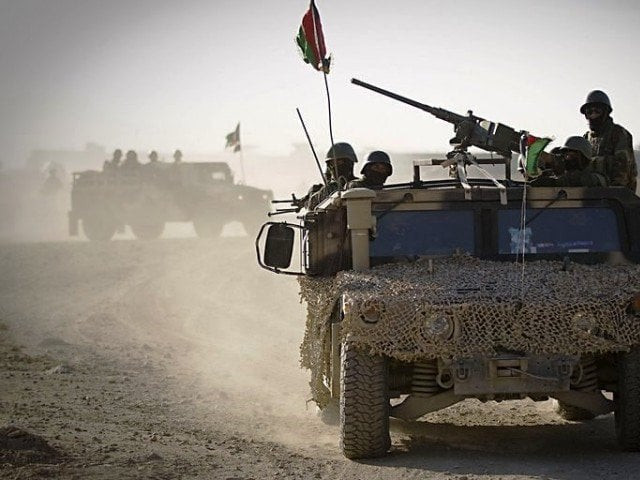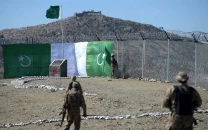US eyeing prolonged Afghan conflict: officials
Internal Pakistani assessment sees little desire for peace accord

Soldiers of the Afghan National Army (ANA) drive on a road near Tagab in Kapisa Province. PHOTO: AFP/FILE
The assessment came against the backdrop of recent developments, including the May 21st US drone strike in Balochistan that killed Afghan Taliban chief Mullah Akhtar Mansoor.
A senior official with knowledge of ‘internal consultations’ revealed to The Express Tribune that certain events in recent months have led Pakistani foreign and national security policymakers to believe the “US is not keen about any peace deal in Afghanistan.”
US scuttled Afghan peace push: Sartaj
“They (the US) probably want to establish permanent military bases in Afghanistan to keep a check on China,” claimed the official, who requested not to be named as he was not authorised to speak to the media.

Independent commentators have long argued that Afghanistan is at the centre of a new ‘Great Game’ being played among powerful countries, including the US and China, but this is the first time that Pakistani official circles have acknowledged the same.
“The US will have no reason to stay in Afghanistan if there is a peace deal,” the official explained when asked as to why the world’s sole superpower would want instability in Afghanistan.
To support his claim, the official argued that the Afghan peace process was sabotaged twice in less than a year — first due to reports confirming Mullah Omar’s death and now through the killing of his successor Mullah Mansoor in a US drone strike. Pakistan suspects both events were deliberate attempts to ensure that peace deal efforts flounder.
The official disclosed that the Afghan Taliban had almost agreed to return to the negotiating table and a direct meeting was being planned in July this year. However, the US, despite having full knowledge of progress in peace efforts, went ahead with its decision to target Mansoor.
Afghanistan, Pakistan discuss fate of peace process after Mansour's death
US authorities did not give a satisfactory answer when Pakistan confronted them to explain the real objective behind the Naushki drone strike. Islamabad now suspects the US is also behind the leaking the death of Taliban supreme leader Mullah Omar last July. The news, according to a Pakistani official, was deliberately leaked by elements close to Afghanistan’s former president Hamid Karzai in an effort to sabotage the second round of peace talks.
The official said Pakistan presented evidence to US authorities over the ‘deliberate leak’ but they refused to pay any heed. “This shows America’s lack of interest in peace deal,” the official insisted.
Officially, although Pakistan still maintains that it is committed to the four-nation peace initiative, sources said its cooperation is now linked with certain ‘guarantees’.
Last week, US Special Representative for Afghanistan and Pakistan Richard Olson and Senior Adviser and Director for South Asian Affairs at the National Security Council Dr Peter Lavoy visited Pakistan to discuss the situation arising out of the drone strike.
Sources said the Pakistani side told the US delegation that both Washington and Kabul will have to stop Islamabad ‘bashing’ if they ‘want us to play any meaningful role’ for the Afghan peace process.
The US officials were also informed that Pakistan will not accept ‘any more drone strikes.’ At the same time, Pakistan demanded decisive action against the safe havens of Tehreek-e-Taliban Pakistan (TTP) and its chief Mullah Fazlullah inside Afghanistan.
“We will also further tighten border controls irrespective of the US or Afghanistan’s reservations,” the official said.
Published in The Express Tribune, June 13th, 2016.



















COMMENTS
Comments are moderated and generally will be posted if they are on-topic and not abusive.
For more information, please see our Comments FAQ